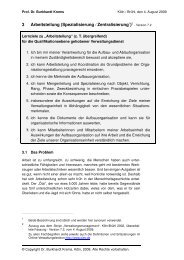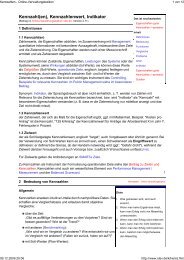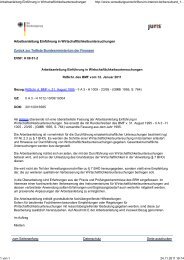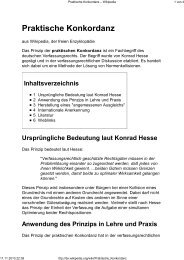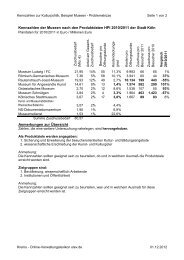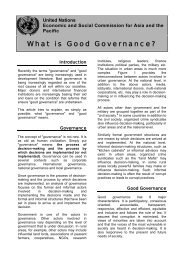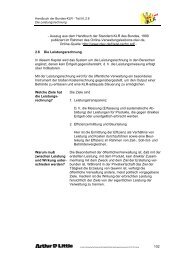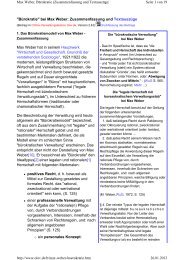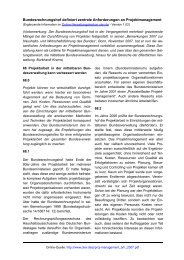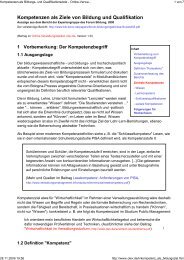The European Benchmarking Code of Conduct - Online ...
The European Benchmarking Code of Conduct - Online ...
The European Benchmarking Code of Conduct - Online ...
Create successful ePaper yourself
Turn your PDF publications into a flip-book with our unique Google optimized e-Paper software.
<strong>The</strong> <strong>European</strong> <strong>Benchmarking</strong> <strong>Code</strong> <strong>of</strong> <strong>Conduct</strong><br />
(Übernommen am 21.09.2006 in das <strong>Online</strong>-Verwaltungslexikon http://www.olev.de von<br />
http://www.benchmarking.gov.uk/content/documents/code<strong>of</strong>conduct.doc,<br />
Formatierung lesefreundlicher gestaltet. Urheberrechtshinweise siehe am Ende. B. K.)<br />
Introduction<br />
<strong>Benchmarking</strong> - the process <strong>of</strong> identifying and learning from best practices in other<br />
organisations - is a powerful tool in the quest for continuous improvement and performance<br />
breakthroughs. <strong>The</strong> authors and sponsors have produced this <strong>European</strong><br />
<strong>Code</strong> <strong>of</strong> <strong>Conduct</strong> to guide benchmarking encounters and to advance the pr<strong>of</strong>essionalism<br />
and effectiveness <strong>of</strong> benchmarking in Europe. It is closely based on the widely<br />
used APQC/SPI <strong>Code</strong> <strong>of</strong> <strong>Conduct</strong> promoted by the International <strong>Benchmarking</strong><br />
Clearinghouse, and the authors gratefully acknowledge this source. <strong>The</strong> wording has<br />
been modified to take into account the rules <strong>of</strong> <strong>European</strong> Union competition law. <strong>The</strong><br />
layout and presentation have been modified to provide a more positive chronological<br />
approach.<br />
Adherence to this <strong>Code</strong> will contribute to efficient, effective and ethical benchmarking.<br />
1.0 Principle <strong>of</strong> Preparation<br />
1.1 Demonstrate commitment to the efficiency and effectiveness <strong>of</strong> benchmarking<br />
by being prepared prior to making an initial benchmarking contact.<br />
1.2 Make the most <strong>of</strong> your benchmarking partner's time by being fully prepared<br />
for each exchange.<br />
1.3 Help your benchmarking partners prepare by providing them with a questionnaire<br />
and agenda prior to benchmarking visits.<br />
1.4 Before any benchmarking contact, especially the sending <strong>of</strong> questionnaires,<br />
take legal advice.<br />
2.0 Principle <strong>of</strong> Contact<br />
2.1 Respect the corporate culture <strong>of</strong> partner organisations and work within mutually<br />
agreed procedures.<br />
2.2 Use benchmarking contacts designated by the partner organisation if that is<br />
its preferred procedure.<br />
2.3 Agree with the designated benchmarking contact how communication or responsibility<br />
is to be delegated in the course <strong>of</strong> the benchmarking exercise.<br />
Check mutual understanding.<br />
2.4 Obtain an individual's permission before providing their name in response to<br />
a contact request.<br />
2.5 Avoid communicating a contact's name in open forum without the contact's<br />
prior permission.<br />
EUROCODE - 2000 Page 1 <strong>of</strong> 5
3.0 Principle <strong>of</strong> Exchange<br />
3.1 Be willing to provide the same type and level <strong>of</strong> information that you request<br />
from your benchmarking partner, provided that the principle <strong>of</strong> legality is observed.<br />
3.2 Communicate fully and early in the relationship to clarify expectations, avoid<br />
mis-understanding, and establish mutual interest in the benchmarking exchange.<br />
3.3 Be honest and complete.<br />
4.0 Principle <strong>of</strong> Confidentiality<br />
4.1 Treat benchmarking findings as confidential to the individuals and organisations<br />
involved. Such information must not be communicated to third parties<br />
without the prior consent <strong>of</strong> the benchmarking partner who shared the<br />
information. When seeking prior consent, make sure that you specify clearly<br />
what information is to be shared, and with whom.<br />
4.2 An organisation's participation in a study is confidential and should not be<br />
communicated externally without their prior permission.<br />
5.0 Principle <strong>of</strong> use<br />
5.1 Use information obtained through benchmarking only for purposes stated to<br />
and agreed with the benchmarking partner.<br />
5.2 <strong>The</strong> use or communication <strong>of</strong> a benchmarking partner's name with the data<br />
obtained or the practices observed requires the prior permission <strong>of</strong> that<br />
partner.<br />
5.3 Contact lists or other contact information provided by benchmarking networks<br />
in any form may not be used for purposes other than benchmarking.<br />
6.0 Principle <strong>of</strong> Legality<br />
6.1 If there is any potential question on the legality <strong>of</strong> an activity, you should<br />
take legal advice.<br />
6.2 Avoid discussions or actions that could lead to or imply an interest in restraint<br />
<strong>of</strong> trade, market and / or customer allocation schemes, price fixing,<br />
bid rigging, bribery, or any other anti-competitive practices. Don't discuss<br />
your pricing policy with competitors.<br />
6.3 Refrain from the acquisition <strong>of</strong> information by any means that could be interpreted<br />
as improper including the breach, or inducement <strong>of</strong> a breach, <strong>of</strong><br />
any duty to maintain confidentiality.<br />
6.4 Do not disclose or use any confidential information that may have been obtained<br />
through improper means, or that was disclosed by another in violation<br />
<strong>of</strong> a duty <strong>of</strong> confidentiality.<br />
6.5 Do not, as a consultant, client or otherwise pass on benchmarking findings<br />
to another organisation without first getting the permission <strong>of</strong> your benchmarking<br />
partner and without first ensuring that the data is appropriately<br />
'blinded' and anonymous so that the participants' identities are protected.<br />
EUROCODE - 2000 Page 2 <strong>of</strong> 5
7.0 Principle <strong>of</strong> Completion<br />
7.1 Follow through each commitment made to your benchmarking partner in a<br />
timely manner.<br />
7.2 Endeavour to complete each benchmarking study to the satisfaction <strong>of</strong> all<br />
benchmarking partners as mutually agreed.<br />
8.0 Principle <strong>of</strong> Understanding and Agreement<br />
8.1 Understand how your benchmarking partner would like to be treated, and<br />
treat them in that way.<br />
8.2 Agree how your partner expects you to use the information provided, and<br />
do not use it in any way that would break that agreement.<br />
Origins<br />
This <strong>Code</strong> <strong>of</strong> <strong>Conduct</strong> is the result <strong>of</strong> a consultation and development process coordinated<br />
by <strong>The</strong> Performance Improvement Group with the help <strong>of</strong> <strong>The</strong> Eurocode<br />
Working Group. <strong>The</strong> Eurocode Working Group comprises senior <strong>Benchmarking</strong><br />
managers and legal representatives from the following organisations: BT, Department<br />
<strong>of</strong> Trade and Industry (UK), <strong>European</strong> Foundation for Quality Management, IFS<br />
International, KPMG Peat Marwick (USA), Shell International, Siemens, <strong>The</strong> Benchmark<br />
Network, <strong>The</strong> Post Office.<br />
Contributions were also gratefully received from the following: American Productivity<br />
and Quality Center, British Quality Foundation, Prudential Assurance, Swedish Institute<br />
<strong>of</strong> Quality, Strategic Planning Institute, <strong>The</strong> <strong>Benchmarking</strong> Centre UK, <strong>The</strong><br />
<strong>Benchmarking</strong> Club Italy, <strong>The</strong> Law Society, <strong>The</strong> Quality Network.<br />
Important Notice<br />
This <strong>Code</strong> <strong>of</strong> <strong>Conduct</strong> is not a legally binding document. Though all due care has<br />
been taken in its preparation, the authors and sponsors will not be held responsible<br />
for any legal or other action resulting directly or indirectly from adherence to this<br />
<strong>Code</strong> <strong>of</strong> <strong>Conduct</strong>. It is for guidance only and does not imply protection or immunity<br />
from the law.<br />
<strong>Benchmarking</strong> Protocol<br />
Benchmarkers:<br />
• Know and abide by the <strong>European</strong> <strong>Benchmarking</strong> <strong>Code</strong> <strong>of</strong> <strong>Conduct</strong>.<br />
• Have basic knowledge <strong>of</strong> benchmarking and follow a benchmarking process.<br />
• Should have:<br />
‣ Determined what to benchmark<br />
‣ Identified key performance variables to study<br />
‣ Recognised superior performing organisations<br />
‣ Completed a rigorous internal analysis <strong>of</strong> the process to be benchmarked<br />
before initiating contact with potential benchmarking partners.<br />
EUROCODE - 2000 Page 3 <strong>of</strong> 5
• Prepare a questionnaire and interview guide, and share these in advance if requested.<br />
• Possess the authority to share and are willing to share information with benchmarking<br />
partners.<br />
• Work through a specified contact and mutually agreed arrangements.<br />
When the benchmarking process proceeds to a face-to-face site visit, the following<br />
behaviours are encouraged:<br />
• Provide meeting agenda in advance.<br />
• Be pr<strong>of</strong>essional, honest, courteous and prompt.<br />
• Introduce all attendees and explain why they are present.<br />
• Adhere to the agenda.<br />
• Use language that is universal, not one's own jargon.<br />
• Be sure that neither party is sharing proprietary or confidential information unless<br />
prior approval has been obtained by both parties, from the proper authority.<br />
• Share information about your own process, and, if asked, consider sharing study<br />
results.<br />
• Offer to facilitate a future reciprocal visit.<br />
• Conclude meetings and visits on schedule.<br />
• Thank your benchmarking partner for sharing their process.<br />
<strong>Benchmarking</strong> with Competitors<br />
<strong>The</strong> following guidelines apply to both partners in a benchmarking encounter with<br />
competitors or potential competitors:<br />
• In benchmarking with competitors, ensure compliance with competition law.<br />
• Always take legal advice before benchmarking with competitors. (Note: When<br />
cost is closely linked to price, sharing cost data can be considered to be the same<br />
as price sharing).<br />
• Do not ask competitors for sensitive data or cause the benchmarking partner to<br />
feel they must provide such data to keep the process going.<br />
• Do not ask competitors for data outside the agreed scope <strong>of</strong> the study.<br />
• Consider using an experienced and reputable third party to assemble and 'blind'<br />
competitive data.<br />
• Any information obtained from a benchmarking partner should be treated as you<br />
would treat any internal, confidential communication. If 'confidential' or 'proprietary'<br />
material is to be exchanged, then a specific agreement should be executed<br />
to indicate the content <strong>of</strong> the material that needs to be protected, the duration <strong>of</strong><br />
the period <strong>of</strong> protection, the conditions for permitting access to the material, and<br />
the specific handling requirements that are necessary for that material.<br />
Ownership<br />
This document has open ownership, and may be freely reproduced and distributed to<br />
further the cause <strong>of</strong> good benchmarking practice. If you reproduce the <strong>Code</strong> <strong>of</strong> <strong>Conduct</strong>,<br />
print it in its entirety, giving credit to the members <strong>of</strong> the Eurocode working<br />
EUROCODE - 2000 Page 4 <strong>of</strong> 5
group who contributed their time and expertise without cost. Anyone requiring further<br />
information or wishing to participate in the Eurocode Working Group should contact:<br />
Robin Walker, <strong>The</strong> Performance Improvement Group, <strong>The</strong> Old Vicarage, Offenham,<br />
Evesham WR11 5RL Tel: 07974 919175 Fax: 01386 40703 Email:<br />
RobinWalker@msn.com<br />
EUROCODE - 2000 Page 5 <strong>of</strong> 5





